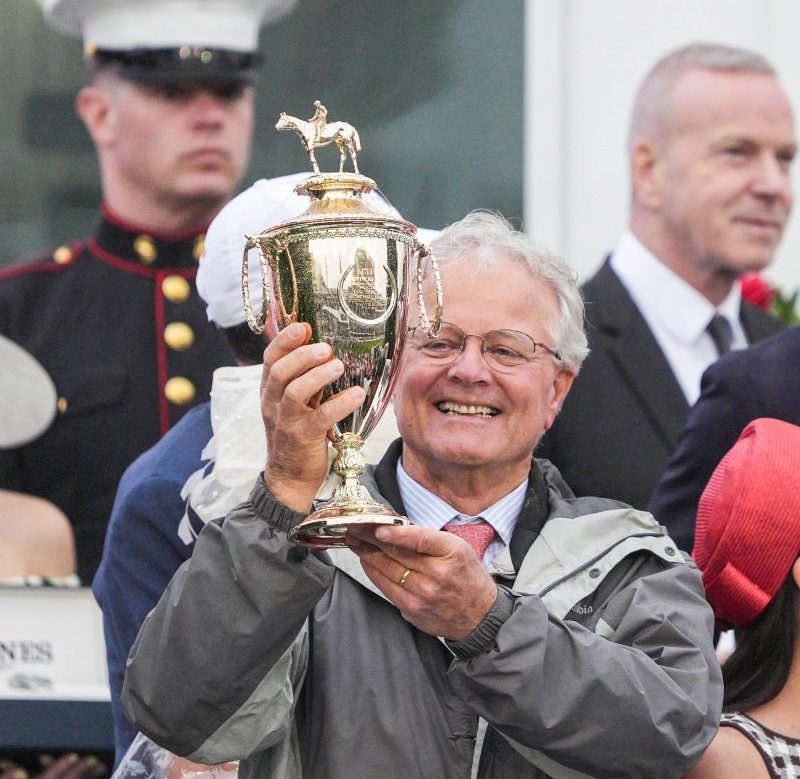LOUISVILLE, Ky. — He was 14 years old, sitting in the front seat of his GMC pickup truck, listening to the radio call of Bobby Ussery ride Proud Clarion to a 30-to-1 upset in the Kentucky Derby.
It would be a nice, tidy story if Bill Mott could tell people now that when he started training horses, he would eventually do it for men who build airplanes and rule countries and that he’d get some who could bring him into the winner’s circle of the biggest race in the world.
But that wouldn’t be true. Because from his tiny town in South Dakota, just across the Missouri River from the state capital Pierre, even bringing a horse to Churchill Downs — much less running in the Derby — would have felt much too big.
“I never even imagined that I would ever be here,” he said. ‘It was just a dream that was too far away. And to be up here thinking back at that, it’s like going to outer space.”
But to blast off into the atmosphere, you need a rocket ship. And on Saturday, Sovereignty turned on the afterburners in the stretch of the 151st Derby, passing race favorite Journalism and bending Mott’s time-space continuum in more than one way.
Because even though it wasn’t the first Derby win for a trainer who has been among the best in the sport for four decades, it almost felt like it.
In 2019, the Mott trainee Country House was named the Derby winner when the Kentucky racing stewards disqualified Maximum Security for drifting out at the top of the stretch and interfering with two other horses.
Mott was, of course, happy to finally be a Derby winner. They lifted the trophy, got the garland of roses and celebrated into the night. But it was, admittedly, awkward if not downright bittersweet to get there that way.
Much, much better.
“You have the joy of being here,” said Riley Mott, his 33-year-old son who is now a trainer with his own string of 40 horses. “But crossing the wire first is a different animal.”
So is Sovereignty — and so is Mott.
In a sport where the characters on the backstretch are famously good at overhype, misdirection and sometimes a little bit of chicanery, Mott is one trainer you’ll never hear a bad word about.
For more than 30 years in the national spotlight, beginning when he trained the great Cigar to a remarkable 16-race winning streak back in 1995 and 1996, Mott has been regarded as a consummate gentleman and a patient, old school horseman who never pushes them beyond their capabilities.
It is, perhaps, why Mott actually hadn’t run many horses in the Derby — just eight prior to Country House — relative to the success he had in other big races. He might have been a little too patient, knowing just how little time you have to develop a horse to get them ready to run 1 1/4 miles on the first Saturday in May of their 3-year-old year. He wasn’t going to enter a horse just to be at the party.
“To win these types of races, you can’t have many hiccups in your training schedule or the way the horse is doing,” Mott said.
To underline that point, consider that Sovereignty is the first Derby winner for Godolphin, the international racing and breeding operation owned by Sheikh Mohammed bin Rashid Al Maktoum, the head of the ruling family of Dubai.
The Maktoums have almost certainly spent more money on horses than any human beings in the history of the world, and they have won pretty much every race around the world worth winning, from the Epsom Derby in England to the Prix de L’Arc de Triomphe in France to the Japan Cup to the Melbourne Cup to the Breeders’ Cup Classic.
But none of them had ever won the Kentucky Derby until Saturday, and it certainly wasn’t for lack of trying. That’s horse racing, though. Everything has to go right — not just on Saturday but for months leading up to the race. That’s why the little guys, relatively speaking, always have a chance on Derby Day. But this year, the biggest fish in the sport just happened to swallow them all.
“It’s been a long time coming,” Michael Banahan, the director of American bloodstock for Godolphin, said. “Do we expect to win these type of races? No, you don’t. You just expect to have some nice horses that you can give them the opportunity, give them great trainers like we have. And if we get one good enough to win the Derby, fantastic. We certainly don’t think that just because we have some nice horses that we’re going to be able to get a seat at this table and be the winner of the race.”
But there were some clues that maybe Sovereignty was different.
Despite starting his career 0-for-2 at shorter distances last summer, it said a lot about what kind of talent Mott thought he had in his barn when he entered Sovereignty in the Street Sense, an important 2-year-old stakes race at Churchill last October.
Sovereignty won that race easily, coming from last place, showing that he enjoyed the Churchill surface and that he would thrive in longer races. Suddenly, the Derby was the obvious goal. But for the next four months, Sovereignty disappeared to the anonymity of Payson Park, a training center in Florida. He didn’t surface again until March 1 at the Fountain of Youth Stakes, when he once again made a sweeping wide move to win by a neck and establish himself as a legitimate contender.
But it was such a big effort coming off a long layoff that Mott did not push the colt too hard to get ready for the Florida Derby four weeks later, knowing the more important goal was still ahead.
Still, Sovereignty finished a good second to Tappan Street, who had to scratch from the Kentucky Derby due to an injury. Mott still felt as if his horse was on track and improving. But the betting public wasn’t as enamored with that effort as Mott was and allowed Sovereignty to go off at 7-1 by post time, a bit higher than the 5-1 he was assigned on the morning line.
And as jockey Junior Alvarado guided Sovereignty from the No. 18 post to a ground-saving position on the rail around the first turn, Mott felt good — especially when he saw fast early fractions on the front end that would favor horses coming from behind.
But still, even though he would always be a Derby winner — and certainly didn’t need another to validate one of the greatest careers in the history of the sport — he didn’t quite know what it would feel like to watch his horse cross the finish line first.
Until it happened, much to the delight and surprise of that young man who started training horses in South Dakota at 14 and listened to the Derby on the radio of an old truck.
“They’re all special, and I don’t want to take anything away from Country House’s effort because he actually ran a very good race on that day,” Mott said. “The stewards did the right thing. It was a no-brainer that they put us up.
‘But this is better.”

